| Characters |
|---|
|
Sam Lowry (Jonathan Pryce) is an obscure employee for the Department of Records who in reality is the sole reason why the department continues to function. Sam blindly accepts the absurd restrictions that the Ministry of Information has imposed on society and finds satisfaction in the anonymity of his career; by not seeking a higher job or “promotion beyond his abilities” like the other Ministry workers, Sam has time to lose himself in fantasies (Sterritt and Rhodes 91). He also rejects all responsibility attached to his role in the workings of the government. When a bomb explodes in the ritzy restaurant where Sam is dining with his mother and her friend, he shrugs off the ladies’ demands to “do something about these terrorists” with the comment, “I’m on my lunch break. Besides, it’s not my department” (Brazil). Everything changes when the woman he has been fantasizing about appears in real life. Consumed by a desire to find her, Sam is driven to revolt against the oppressive government. As Terry Gilliam explains, “Falling in love humanizes him, and ultimately destroys him” (Sterritt and Rhodes 91). |
|---|---|
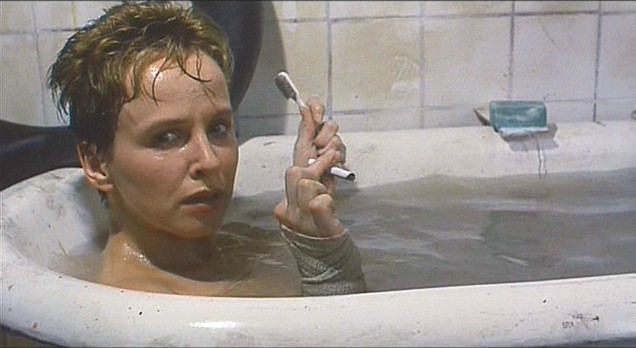 |
Jill Layton (Kim Greist) is a neighbor of the Buttle family and a witness to the arrest of Archie Buttle. She appears in Sam’s dreams as a veiled, angelic figure in danger from the perils of the city: skyscrapers which shoot up from the ground, roaming bands of wraithlike creatures wearing sinister doll masks, and a gleaming metallic giant. Jill’s character is more elaborate than that of Sam; she is far more intelligent and has stronger morals. Yet the two are similar in their need for shelter from the restrictions of social life. Jill drives a delivery truck to obtain the freedom and solitude that Sam achieves in his escapist dreams. When the two separate worlds of Sam and Jill collide, their love is stamped out by a system which rejects compassion and thrives on fear and isolation (Sterritt and Rhodes 92). |
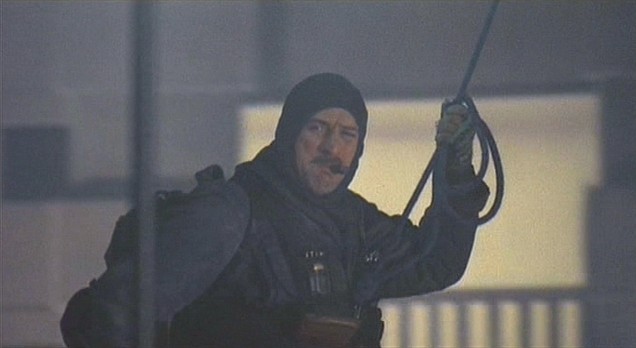 |
Harry Tuttle (Robert DeNiro) is an independently working heating engineer who intercepts citizens’ pleas for assistance to Central Services and arrives at their homes to fix their ducts. A key characteristic of Gilliam’s dystopia is the duct system which provides buildings with heating, air conditioning, and electricity. The ducts are constantly breaking down, and Central Services, the nationalized duct supplier and repair service, is too overworked and its employees too inept to properly fix all of the failed duct systems. The Ministry of Information has labeled Tuttle a terrorist working to subvert governmental authority. Tuttle is a hero of the story because he is the only one who enjoys his job and consequentially can perform it efficiently. |
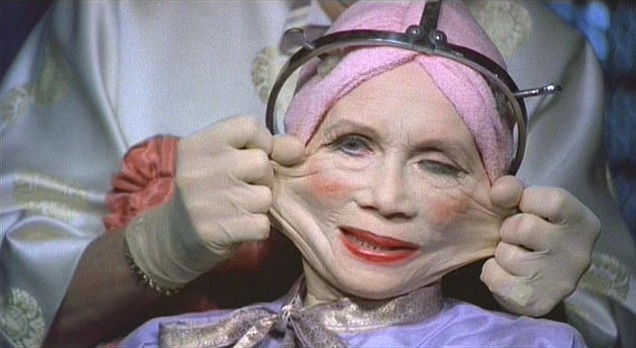 |
Mrs. Ida Lowry (Katherine Helmond), the mother of Sam, is a wealthy dame who knows “absolutely everyone,” follows the latest trends, has a bevy of admirers, and seems right at home in the dystopian society (Brazil). Mrs. Lowry spends her riches on memberships to exclusive dinner clubs, leopard-print shoe-hats, and extensive and ridiculous cosmetic surgery procedures. These treatments leave her younger-looking, artificial in both appearance and in personality; "superficial materical replaces [her] soul" (Taylor). Mrs. Lowry lives in a lavish suite of apartments in an affluent section of town, completely isolated from the desolation and decay of the rest of the city. Mrs. Lowry despairs of her son’s lack of ambition at work and is forever using her social connections to gain unwanted promotions for Sam. |
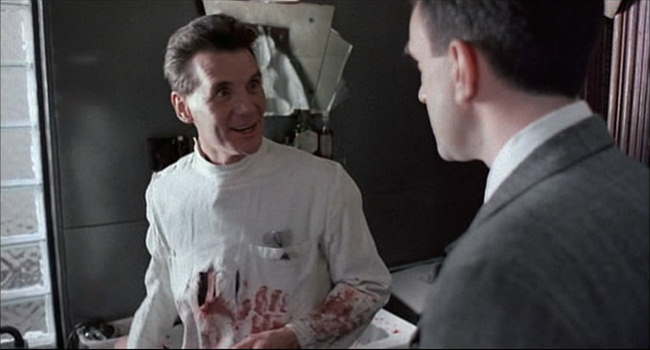 |
Jack Lint (Michael Palin) is a model citizen of Gilliam's dysfunctional dystopia. Jack has climbed and fought his way to a high position in the Ministry as an interrogator for Information Retrieval. He is so overawed by grandeur and power that when the Deputy Minister, Mr. Helpmann, mistakenly calls Jack's wife Alice by the name Barbara, Jack decides to call her Barbara from then on, reasoning, "Why not? Barbara's a perfectly good name" (Brazil). Jack is inappropriately cheerful at work, covered in the blood of his "clients," and even brings one of his young daughters to his office with him; in the interrogation scene, the tray bearing Jack's torture devices also includes a bouncy ball and a pacifier. Jack is a prime example of a person who has forsaken traditional values such as family and loyalty to one's friends in pursuit of material gain. |
| Setting |
|---|
Filming for Brazil took place in London, in a series of abandoned flour mills, power plants, historic mansions, and city side streets. In his commentary for the Criterion version of the movie, Gilliam states that he had hoped for Brazil to appear to take place “everywhere in the twentieth century,” but it turned out to be set mainly in 1940s America (Brazil). Yet at no point in the film is a name given to the city; in his “perverse” way, Gilliam abstained from giving an exact setting to the plot because society’s first instinct is to “try to nail down the location” of this dystopian world in order to control it. Instead of parodying just one place in the world, Brazil is a reflection of society in general and human instincts to trust technology, follow the government, and betray one’s neighbors for material gain. Inspiration for the setting and set design came from a variety of sources: New York City, Los Angeles (a former home of Terry Gilliam), Edwardian England, the German expressionist movement, and Fritz Lang's Metropolis, to name a few. |
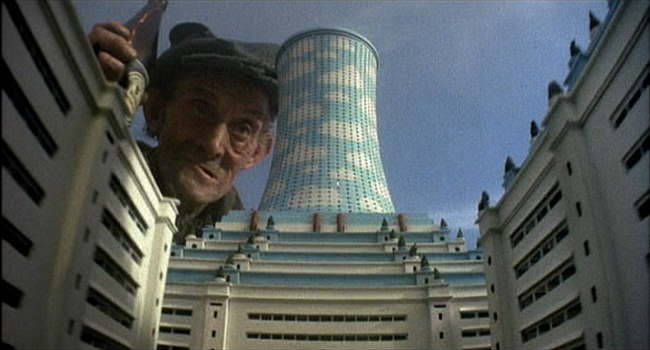 |
|---|